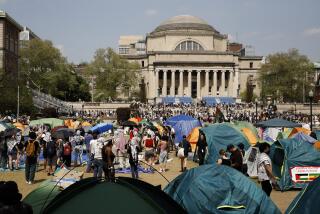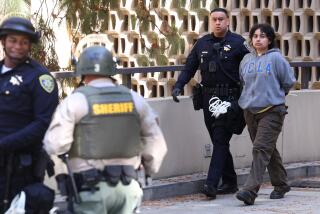Students Hail Harvard President
CAMBRIDGE, Mass. — If Harvard University President Lawrence H. Summers was worried about how the undergraduates would greet him Wednesday night at his first scheduled event since announcing his resignation, those fears quickly were put to rest.
He got a standing ovation after he walked in. He got a standing ovation before he left. A row of students with red letters painted on their chests spelled out “Larry.”
Sarah Bahan, 22, was wistful as she left the meeting. She had kind words to say about Summers’ emphasis on hard sciences.
Mark Hoadley, 21, said Summers’ monotone speaking style was balanced by a “dynamic mind.”
Troy Kollmer, 21, said “a lot of students feel bad for him and think he got a raw deal.”
The show of student loyalty has come as a surprise to many faculty members and administrators at Harvard, who grew to loathe Summers during a five-year tenure that brought a raw blast of politics to the 370-year-old institution.
In the past, it had been Harvard’s students who forced change. In the spring of 1969, amid unrest over the Vietnam War, students angered by a campus ROTC program raided University Hall and threatened to burn the card catalog at Widener Library. The turmoil hastened the resignation of then-president Nathan Pusey, a classics scholar who had little patience for such activism.
This time, students held back while the faculty fumed. Undergraduates were well-insulated from the tempestuous management issues between Summers and top administrators; and Summers had endeared himself to students by showing up at early morning rugby matches and by gamely boogieing at school dances.
But somewhere in the controversy surrounding Summers is evidence of a change in campus politics, one professor said: These days, it is not unusual for students to be to the political right of their professors.
“This is a sort of ‘I’m-not-a-feminist-but’ generation,” said J. Lorand Matory, a professor of anthropology and of African and African American studies. “I don’t know if the word is ‘conservative’ as much as ‘careerist.’ ”
The move to oust Summers began in earnest last year after he gave a speech that questioned whether “issues of intrinsic aptitude” explained the shortage of female professors in Harvard’s math and science departments.
Already, he had angered many African American faculty members by confronting the scholar Cornel West, who then left Harvard for Princeton. Some deans and top administrators followed.
This winter, he was criticized for backing a friend, Harvard economist Andrei Shleifer, who was accused of defrauding the U.S. by investing his own money in a government-funded program designed to help transform Russia into a market economy. Harvard defended Shleifer in a civil suit, then paid a $26-million settlement.
Summers’ support in faculty circles continued to dwindle until -- at a faculty meeting Feb. 7 -- there was no one left to speak in his defense.
Many students, meanwhile, thought the “intrinsic aptitude” flap of last spring had been resolved. “Our complaints ended when there was a reasonable dialogue,” said Jonathan Blazek, 21.
The most comprehensive poll of student opinion came this week, after the Harvard Crimson e-mailed questions to 840 undergraduates. The 424 who responded were relatively supportive of Summers.
Thirty-nine percent said they approved of his job performance, 30% said they did not and 31% had no opinion. Asked whether he should resign, 57% said no and 19% said yes.
One reason for the disconnect between student and faculty attitudes toward Summers is that many of the most deeply felt complaints concern his treatment of professors and administrators -- matters that have been quiet.
For example, Peter T. Ellison recently gave an interview to the Boston Globe, explaining why he had stepped down as dean of the Graduate School of Arts and Sciences.
He described Summers commenting, in a private meeting, that “economists are smarter than political scientists, and political scientists are smarter than sociologists” -- playing into widespread fears that he favored some disciplines over others.
In the same meeting, Ellison said, Summers suggested shifting authority for a doctoral program from the sociology department to the John F. Kennedy School of Government. Ellison said he believed his authority was being undermined. Later, Ellison said, Summers promised to send out a letter saying the change would not occur.
“This does not seem to me any longer to be a matter of style or personality, but of character,” Ellison wrote in a statement to the Globe.
Many faculty members and administrators shared similar stories, detailing a growing climate of fear, said Elizabeth Nathans, former dean of freshmen. She left Harvard involuntarily in 2005 and now is an administrator at Boston College.
But, Nathans said, students did not know what was happening. “It is to the faculty’s credit that they don’t. Faculty members have been very circumspect, trying to deal with it privately,” she said.
Since Summers announced his resignation Tuesday, his most vocal defenders have been students.
On a blog called “Summersville,” students have placed memorial posters of their soon-to-be-departed president and floated plans for a protest at an upcoming faculty meeting.
“I don’t think everybody on campus loves him, but there is sort of a general sense the situation was handled poorly,” Harry Ritter, 21, said.
Ritter worries, he said, that the initiatives Summers began -- the expansion of Harvard’s campus, study-abroad programs and beefing up of the life sciences, among others -- will founder.
“If the faculty now feels it has the power to kick a president out
Michael Broukhim, 21, an editorial chair for the Harvard Crimson, said some students grew to admire the same qualities in Summers that alienated professors -- such as his clear enthusiasm for subjects with real-world applications, like stem cell research and globalization.
“The fact that Summers worked in politics [as Treasury secretary] is indicative -- he wants the university to be oriented, very practically, toward the public good,” Broukhim said.
To Matory, the African American studies professor, it was no surprise that students were not calling to oust Summers. Students rarely have occasion to interact with a university president, he said, and tend not to follow internal faculty politics.
“If anything,” Matory said, “the vast number of students don’t care.”
Harry Lewis, a computer science professor and former dean of Harvard College who left under pressure from Summers, said campus politics here had been shifting for decades, as more students from less affluent backgrounds enrolled.
A more diverse group, they are also “eager to prosper and less willing to take risks by rebelling,” Lewis said. His upcoming book, “Excellence Without a Soul: How a Great University Forgot Education,” traces what he considers to be the decline in the quality of education at Harvard. It’s left them far more likely to support the power structure, he said.
“The Harvard student body looks more like America than the Harvard faculty,” he said. “That’s what’s happened.”
More to Read
Sign up for Essential California
The most important California stories and recommendations in your inbox every morning.
You may occasionally receive promotional content from the Los Angeles Times.










